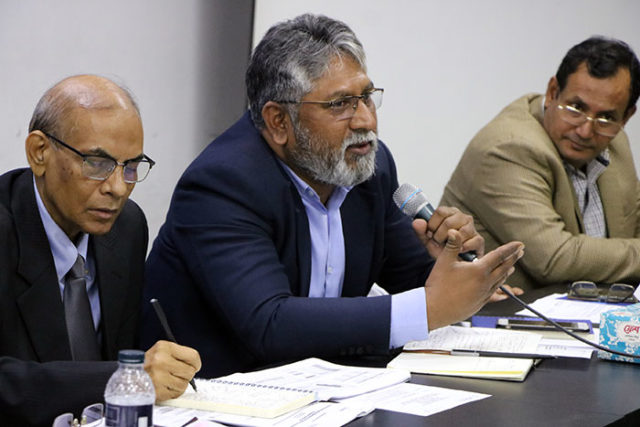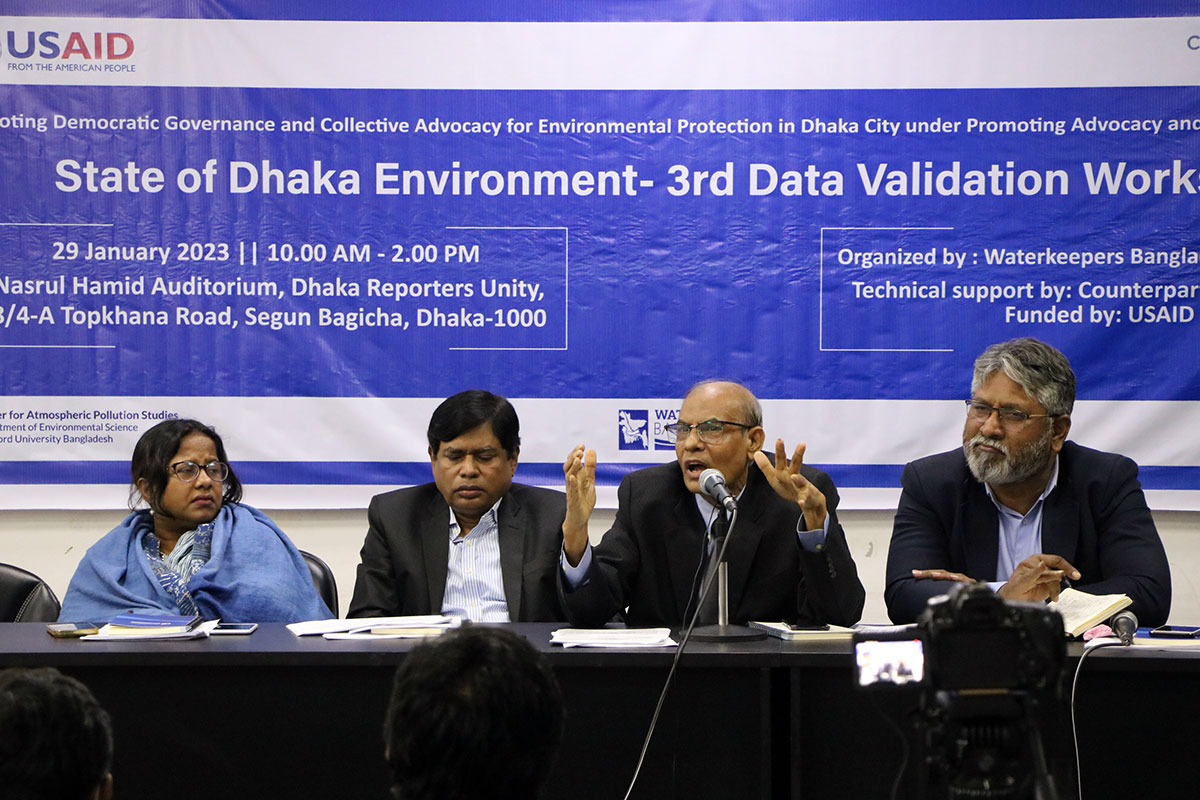Waterkeepers Bangladesh (WKB) consortium is currently implementing an anti-pollution advocacy project. WKB formed a consortium with the Department of Geography and Environment, Jahangirnagar University, Savar, Dhaka and the Center for Atmospheric Pollution Studies (CAPS), Department of Environmental Science, Stamford University Bangladesh to implement a robust anti-pollution advocacy project titled “Promoting democratic governance and collective advocacy for environmental protection in Dhaka city” under the Promoting Advocacy and Rights (PAR) Activity of USAID with the technical support from Counterpart International (CPI). The goal of the project is to implement effective, evidence-based advocacy and targeted community-based action and change the mindsets of citizens and policymakers, leading to lower pollution levels in Dhaka’s rivers and environment.
 Dhaka is one of the few cities in the world surrounded by rivers. Buriganga, Balu, Turag and Shitalakshya are the four major rivers that surround Dhaka city and all of which are interconnected through numerous canals. Unfortunately, the canals and rivers are being grabbed; untreated pollutants are discharged into surface waters while urbanization and industrialization do not follow existing legal frameworks. There is no dissolved oxygen in the river water during the annual lean period for the survival of any aquatic life.
Dhaka is one of the few cities in the world surrounded by rivers. Buriganga, Balu, Turag and Shitalakshya are the four major rivers that surround Dhaka city and all of which are interconnected through numerous canals. Unfortunately, the canals and rivers are being grabbed; untreated pollutants are discharged into surface waters while urbanization and industrialization do not follow existing legal frameworks. There is no dissolved oxygen in the river water during the annual lean period for the survival of any aquatic life.
Air and noise pollution have reached an unbearable situation in Dhaka. The air of Dhaka city is polluted. According to the latest United Nations Environment Program (UNEP) report, Dhaka is the most noise-polluted city in the world.
 In this situation WKB consortium collected water, air, and noise data from the different spots to monitor the pollution level and of produce the State of Dhaka Environment Report (SoDE). The consortium collected noise and air data from the ten 10 locations in Dhaka city. Moreover, the consortium collected water samples (quality data) from 4 selected points in four times in a year for two years from Buriganga and Dhaleshwari rivers.
In this situation WKB consortium collected water, air, and noise data from the different spots to monitor the pollution level and of produce the State of Dhaka Environment Report (SoDE). The consortium collected noise and air data from the ten 10 locations in Dhaka city. Moreover, the consortium collected water samples (quality data) from 4 selected points in four times in a year for two years from Buriganga and Dhaleshwari rivers.
To share the collected data WKB consortium organized the 3rd and final data validation workshop on January 29, 2023, at Nasrul Hamid Auditorium, Dhaka Reporters Unity from 11.00 to 2.00 P. M. This workshop is a formal process for endorsing this data by relevant stakeholders. A total of 73 (6 women and 67 men) participants attended the event. Dr. Muzibur Rahman Howlader, Former Chairman, National River Conservation Commission was present as the Chief guest. Dr. Muhammod Nazrul Islam, Chairman, Department of Geography and Environment, Jahangirnagar University, Savar, Dhaka was the special guest. Among others Mr. Mainuddin Ahmed, Chief of Party Bangladesh, PAR/Counterpart International, Sumana Binte Masud, Project Management Specialist, Civil Society Advisor, USAID were also present.
Mr. Sharif Jamil, Lead, Waterkeepers Bangladesh Consortium chaired and moderated the workshop. Professor Ahmed Kamruzzaman Majumder, consortium member and chairman of Environmental Science, Stamford University Bangladesh presented the analysis of air and noise quality data. Professor Md. Nurul Islam, PhD, Department of Geography and Environment, Jahangirnagar University presented the analysis on water quality data. Dr. Alamgir Hossain, Head of Dhaka Laboratory, Dhaka WASA, and Monir Hossain Chowdhury, Environment & Climate Change Specialist, NRCC were present as discussant to give their opinion on the presented data.
The immediate outcomes of the event are:
1. National-level stakeholders engaged through the workshop and validated pollution data for the evidence-based advocacy where they provided opinion.
2. Obtained feedback, suggestions, and ideas from the participants to finalize the State of Dhaka Environment report.
3. Representatives of government departments, academicians, civil society representatives and journalists appreciated the report, adding that it would serve as a reference for effective advocacy to reduce noise, air and water pollution.
4. Government, private sector, and journalists said, pollution is not stopping due to various irregularities. By presenting this kind of evidence, pressure should be applied to bring various government officials, and policymakers under accountability to reduce environmental pollution and CSOs need to do a lot more work on it.
5. Increased the engagement of CSOs in evidence-based advocacy to protect environmental pollution in Dhaka city for the policy prioritization.
6. Engaged national media who covered the news by which common people will know the information on air, noise and water pollution as well as attract policy mekers on this critical issue.
Quotes:
“The presentation is good and it’s a representative data of the rivers around Dhaka city. However, there is no research data on how much the intensity of pollution has increased due to enchroachment, therefore, this data should collect and incorporate here. When I was chaiman of NRCC I collected the list of encroachers which is not published in the NRCC website. The current chairmen of NRCC has relative in the list and he did not allow to publish online. There are laws to protect rivers and the environment in general, but the department of environemnet does not implement what is required.” – Dr. Muzibur Rahman Howlader, Former Chairman, National River Conservation Commission (NRCC)
“All the 4 rivers around Dhaka are dead due to pollution and encroachment. But the court has declared the rivers as a living entity. Therefore, I think Pollution Pay Principals should be implemented to reduce pollution in our country.’’ – Dr. Muhammod Nazrul Islam, Chairmen, Department of Geography and Environment, Jahangirnagar University
“We all know how the rivers are dying. If there is no aquatic life in the river, it is not beneficial for human beings. This pollution is happening for a long time and it needs to control gradually to reduce public suffering. So, each and everyone’s responsibility to follow the system.” – Dr. Md. Alamgir Hossain, Chief Microbiologists & Lab head, Dhaka WASA
“Around 40% of water pollution is happening from the upstream. There are many industries in Gazipur/Sava city corporation area that are located in upstream area. So, the industrial effluent came from that area and entering to the Buriganga. The river encroachment is also another issue, it seems that NRCC does not want to control river encroachers. They are not taking any initiative to control river pollution and enchraiochemnt. So, there should be inter departmental coordination to control environmental pollution.’’ – Monir Hossain Chowdhury, Environment & Climate Change Specialist, NRCC




